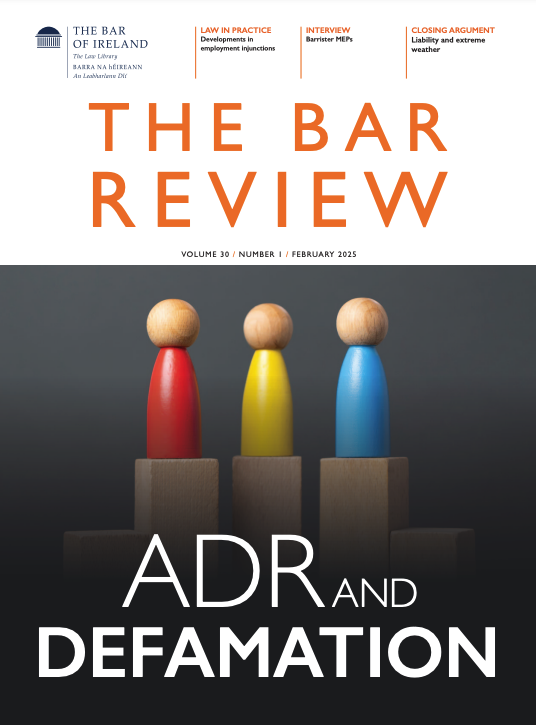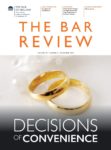Latest legal updates and news from the February issue of The Bar Review include proposed legislation around artificial intelligence; an interview with Hilkka Becker, President of the International Protection Appeals Tribunal; a look into recent probate and succession case law; and analysis around discovery reform.
Highlights from February Issue
Building a Truly Representative Bar

Chair of the Council of The Bar of Ireland, Sara Phelan SC, outlines the soon-to-be-launched Equitable Briefing Policy which is part of a wider effort at The Bar of Ireland to ensure that membership of the Law Library is truly representative of society as a whole.
One could not escape the references in the media over the Christmas break to the fact that January 1, 2023, marked the 50th anniversary of Ireland becoming a member of the then EEC (now the EU). While opinion may be divided on our joining the EEC, it cannot be gainsaid that membership has had a major impact on almost every aspect of Irish life over the past 50 years.
Our membership of the EU has certainly enhanced our social progress, particularly in the areas of employment and equality law, while EU law has also shaped our domestic legislation and the jurisprudence of our national courts regularly intersects with that of the Court of Justice of the EU. Indeed, since the departure of the UK from the EU, Ireland (as one of only two common law jurisdictions remaining in the EU, with Cyprus being the other), has a substantially enhanced role in ensuring that common law principles are secured in the development of EU law. This role was shared with the UK in the past, but now the onus to scrutinise the formulation and enactment of EU legislation and the development of EU jurisprudence by the courts of the EU lies with us. Thankfully, The Bar of Ireland has a significant presence in the EU space, including our very active EU Bar Association, and our membership of the CCBE and the International Bar Association. We must be ever vigilant to protect our common law principles in the EU legal architecture, and the State has an important role in this regard.
Regulating Artificial Intelligence

By Dr. John P Byrne BL
The European Commission is proposing to legislate for the regulation of artificial intelligence, but there are a number of possible pitfalls in this complex area.
Many will be familiar with the story: an Earth in crisis in 2029 sends two artificial intelligence (AI) machines back in time – one to kill the future leader of the resistance to a world dominated by Skynet, and the other to save him. It’s the plot of a Hollywood blockbuster from 1991, and mentioning it at the start of this article helps point to one particular problem in this field; it is a subject matter that is often ridiculed. That problem isn’t helped by the headlines that surrounded the much-publicised, and tragic, passing of Wanda Holbrook, a robotics repair technician, in 2015, which included “robot goes rogue and kills woman” and “what happens when robots kill”. The victim had been working on a bumper repair at a trailer hitch factory in Grand Rapids, Michigan, when a robotic factory arm malfunctioned and struck her fatally in the head. The sensationalist press reaction that followed further heightened the connection in the public consciousness between regulation of AI or, more specifically, regulation of what is called artificial general intelligence (AGI), and a scene from the pages of a sci-fi novel.
Serving Justice

Hilkka Becker, Chair of the International
Protection Appeals Tribunal, talks about her career, the differences between the German and Irish legal systems, and the Tribunal’s work.
When Hilkka Becker came to Ireland from Germany in 1994 as a young law graduate with an interest in immigration/refugee/asylum law, these topics were not prominent features of the Irish legal landscape. In a sense, it could be said that Hilkka’s career reflects the evolution of this area in Irish and EU law, and of the agencies that have developed to support those who come here seeking protection. Hilkka’s own interest stems, she says, from growing up in Germany, and learning about the Nazi regime and the Holocaust, which left her with “a deep-seated feeling, not of guilt, but of responsibility”.
She does not have lawyers in her family, and was in fact the first member of her family to complete a university degree, but law seemed to her the best way to achieve her desire “to serve and achieve justice, which is really at the core of who I am”.
Discovery – Will Reform Work?

By Roderick Bourke and Emile Burke-Murphy BL
It is to be hoped that the recommendations of the Review of the Administration of Civil Justice, when implemented, will finally solve the problem of costly and onerous discovery.
Winston Churchill’s view of the “dreary steeples of Fermanagh and Tyrone” brings to mind discussion about discovery in civil litigation, as courts in common law countries, despite numerous reports and reforms, continue to struggle to make discovery less costly and drawn out. Discovery, particularly in large cases, “can present a barrier to access to justice either for plaintiffs, who may not be able to afford to bring a case, or for defendants, who may find it difficult to exercise their rights of defence because of the burden which discovery might place on them”. Case law and court rules in Ireland have sought to improve matters but “have had only limited practical impact”.
Last Will and Testament

Michael Hourican SC takes a look at recent probate and succession case law, drawn from a number of written judgments.
There has been a significant volume of written judgments in the recent past in the areas of probate and succession, which I propose to address under separate headings according to the relevant subject matter.
In re Mary Eastwood deceased (2021) IEHC 387 (High Court, Allen J., June 4, 2021)
Background
This was an application to the Probate Court to admit a lost will in terms of a copy. The will had been made in a solicitor’s office and the original was retained by the solicitor. Sometime later the deceased wrote to the solicitor asking for a copy of all documents relating to her in his possession, and he replied, indicating that he was enclosing, inter alia, the original will. The applicant (the deceased’s son and the executor named in the will) stated that he collected the deceased’s post and that when he opened the envelope it contained a copy of the deceased’s will, and that that was the copy of the will that he located following the death of the deceased.
Defending the Defenders

International Day of the Endangered Lawyer is a fitting opportunity to raise awareness of human rights abuses concerning lawyers and judges around the globe, writes Gavin Rothwell BL.
January 24 marks what should be an important day in the calendar not only for lawyers, but for anyone who values a democratic society. International Day of the Endangered Lawyer (IDEL) has been organised for the last 15 years by a coalition of bar associations and NGOs in an effort to highlight the risks facing lawyers around the world. This year the country of focus for the IDEL was Afghanistan, and the Human Rights Committee of The Bar of Ireland was privileged to mark the day with an event featuring some of the Afghan judges now living in Ireland, having fled the Taliban in 2021.
It may be somewhat surprising to hear, but the persecution of lawyers (particularly those practising in human and environmental rights) continues worldwide. In Myanmar, for example, the rule of law has come under severe pressure following the military coup in 2021. A recent report from the International Commission of Jurists details some of the behaviour that lawyers now experience as the norm in that jurisdiction: “Lawyers are often threatened in front of judges and are actually arrested in courtrooms for asking witnesses questions about torture and ill-treatment their clients have experienced or for requesting fair trials”.
Download The Bar Review – Volume 28 Issue 1

